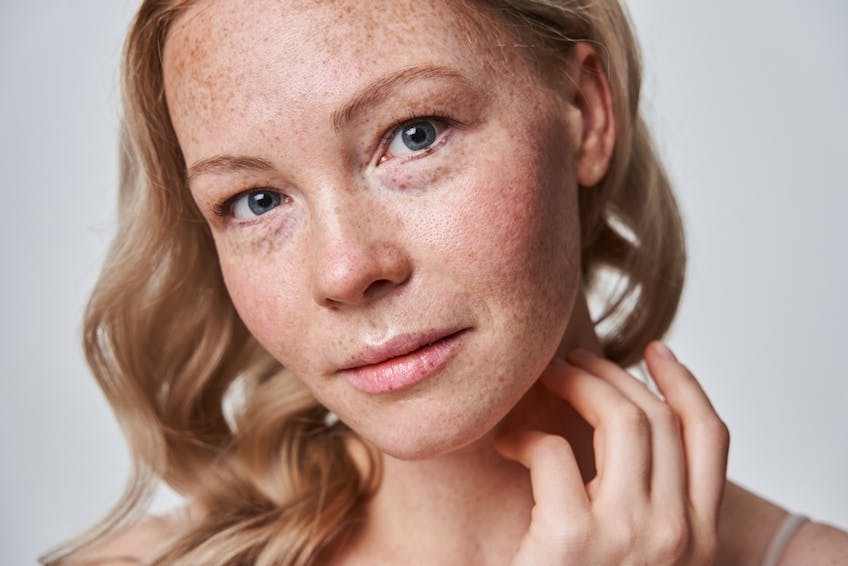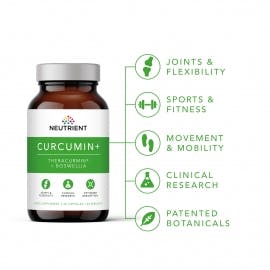Elevate Your Skin Health with Curcumin
Elevate Your Skin Health with Curcumin
When thinking about a beauty regime, curcumin probably isn’t something that immediately springs to mind, but this extraordinary plant compound has a whole host of properties that can help transform your daily skin-care protocol. So, if you’re hoping to regain the golden glow of youth minus the annoying acne and blotchy outbreaks, curcumin may be the skin solution you’ve been looking for.
Turmeric, a culinary spice best known for its use in Asian cuisine is one of the most researched bioflavonoids today and belongs to the family of natural compounds known collectively as Curcuminoids. Curcumin is the pigment that gives turmeric its unmistakable bright yellow colour and is also the active compound responsible for its biological activities.7 The unique health properties of turmeric have been utilised for centuries in traditional Ayurvedic medicine as a remedy for various diseases including digestive disorders and inflammatory conditions. It continues to be popular amongst alternative health practitioners and is frequently used as a complementary option to traditional medicine.
Plant Compounds for Skin Health
In recent years there has been a growing interest in the therapeutic effects of plant-derived natural products like curcumin for inflammatory skin conditions. Curcumin’s broad range of biological activities has placed it at the forefront of numerous clinical trials investigating its use for inflammatory and infectious disorders of the skin. 9 Positive results have led the way for further research.
How Does Curcumin Work?
_1.png)
Due to its extraordinary molecular structure, curcumin shows strong anti-inflammatory, antibacterial and antioxidant properties. Most studies have shown that the principal biological effect of curcumin comes in part from its ability to inhibit pathogenic microbes 1 and regulate several important molecular signaling pathways that govern anti-oxidative properties and inflammatory pathways. These findings indicate that curcumin may have therapeutic potential for supporting skin health. 1
Anti-inflammatory
Curcumin acts to stop the growth of inflammatory cells in various ways. It has been shown to reduce inflammation by lowering the activity of certain enzymes and proteins, and by blocking NF-κB activation. Curcumin is also thought to control the levels of C-reactive protein and CXCR-4 and help to inhibit other important inflammatory molecules like TNF-α.2,4,6. These bioactive properties may help to support overall skin health.
Anti-Microbial Effects
The antimicrobial activity of curcumin has been extensively investigated due to its varied uses and safety profile.10 Scientists have worked to identify how it might combat fungal, viral and bacterial infections. 11 It is thought to stop bacteria from growing because of its structure and the antioxidants it produces. Evidence suggests that curcumin prevents bacteria from becoming harmful in several ways:
- It stops them from forming protective layers (biofilms) 12
- It causes membrane damage to specific types of bacteria 12
- It prevents bacteria from sticking to cells by cleverly interfering with their communication system 10,11
- It blocks the growth of bacteria due to its structural characteristics 12
- When exposed to blue light, curcumin also uses light to kill bacteria 12
- It works alongside other antibacterial substances to fight bacteria 11
Antioxidant
According to research, curcumin is part of a network of other powerful defense nutrients that help to reduce overall oxidative stress in the body. It enhances the activity of antioxidants like superoxide dismutase (SOD) by neutralizing free radicals (unstable molecules that can damage cells).5 Curcumin also enhances the activity of enzymes such as catalase, glutathione peroxidase and SOD, which fight free radicals. Because curcumin dissolves well in fats, it effectively neutralizes the oxidative degradation of fats.5
Skin-Friendly Uses for Curcumin
.png)
Inflammation, oxidative stress and bacterial infection are known to be key drivers of many common skin issues. The pharmacological effects of curcumin may therefore have positive benefits when used alongside other skin-supportive products. Here are some of the key benefits:
Protection Against UV Damage:
Ultraviolet (UV) rays from the sun, particularly UVA and UVB, cause significant skin damage. UVA rays penetrate deep into the skin, generating reactive oxygen species that damage DNA and proteins, leading to premature aging and cancer. UVB rays affect the skin's outer layer, causing direct DNA damage, and sunburn, and playing a major role in skin cancer development. The important defense mechanisms of curcumin may contribute to several natural antioxidants the body uses to counter the harmful effects of UV radiation, reducing the risk of UV-induced skin damage.
Anti-Aging Effects:
Oxidative stress caused by excessive sun exposure, smoking, pollution, chemicals and metabolic processes produces skin damage that plays a role in accelerated ageing. The accumulation of harmful molecules eventually leads to wrinkles and sagging skin. Curcumin's natural defense activities neutralise free radicals helping to protect cells from damage, which makes curcumin an ideal candidate for an anti-ageing skin protocol.
Psoriasis Support
Psoriasis is an autoimmune skin disorder that leaves the skin, red, flaky, itchy and sore. The first step in developing psoriasis involves activating certain immune cells that produce a large amount of inflammation-causing substances that trigger the uncomfortable symptoms.Several trials have evaluated the efficacy of using curcumin for psoriasis and concluded that it is a promising natural compound that could support other conventional medical treatments. 3
Relief from Rosacea
Rosacea is a fairly common condition causing flushing, facial redness and visible blood vessels on the face. It often appears as red patches or swollen bumps and tends to affect mostly middle-aged women with fair skin. Rosacea is associated with inflammation and oxidative tissue damage, which would benefit from natural antioxidants. Making curcumin part of a daily skin-care routine may help to protect highly reactive skin types.
Anti-Acne
Acne most commonly develops on the face, back and chest and causes, spots, pus-filled lumps, blackheads and red bumps that are often sore. It is linked to hormone levels at puberty but can happen at any age. Conventional acne medications can have some unpleasant side effects, such as stinging, redness, itching, dryness and peeling. Natural anti-inflammatory and antimicrobial plant compounds have been used traditionally in Ayurvedic medicine as a gentler approach to acne. Curcumin is a great standby for acne sufferers wishing to avoid conventional therapies.
How to Optimise Curcumin Absorption
.png)
Curcumin is by far the most studied compound, showing safety and non-toxicity, even at high doses however, the bioavailability of raw curcumin is poor, which means your body struggles to absorb it effectively. To enhance absorption, curcumin is often taken with piperine (black pepper extract) or formulated in a liposomal or nanoparticle form.
However, Japanese technology is now leading the way in improving curcumin bioavailability by using sub-micron particle processing and surface-controlled techniques to create Theracurmin®. This innovative technology significantly reduces the size of the curcumin particles making it easily absorbable with far greater bioavailability than raw curcumin.8
Neutrient Curcumin + combines highly absorbable Theracurmin® with Casperome® a patented boswellia extract containing 11 boswellic acids. The addition of Casperome® further enhances the skin-friendly properties of Theracurmin®. Clinical research has shown that Theracurmin® is 42 times more bioavailable than standard oral curcumin supplements.8
Curcumin at a Glance
.png)
- Inflammation is a key factor in various skin conditions, such as acne, rosacea, eczema and psoriasis. By supporting inflammatory responses, curcumin may help alleviate symptoms associated with these conditions and promote overall skin health
- Antioxidants help protect the skin from damage caused by free radicals, which can contribute to premature aging and various skin issues. By neutralising free radicals, curcumin may help maintain the skin's youthful appearance and prevent oxidative stress-induced damage
- Curcumin exhibits antimicrobial properties, which may have favourable effects on the bacteria, fungi, and viruses that contribute to skin infections or exacerbate existing skin conditions
- Consuming high-quality curcumin extracts such as Theracurmin® enhances the bioavailability significantly, which makes it a uniquely valuable supplement with many skin health benefits
Editor: Alejandra Toro, Pshychologist, MSc Nutrition and Behaviour
REFERENCES
Adamczak A, Ożarowski M, Karpiński TM. Curcumin, a Natural Antimicrobial Agent with Strain-Specific Activity. Pharmaceuticals (Basel). 2020 Jul 16;13(7):153. doi: 10.3390/ph13070153. PMID: 32708619; PMCID: PMC7408453
Daria Jovičić et al. NUTRITIONAL AND HEALTH BENEFITS OF CURCUMIN. Food in Health and Disease, scientific-professional journal of nutrition and dietetics 2017;6 (1) 22-27
Elgar K. (2022) Curcumin: A Review of Clinical Use and Efficacy. Nutr Med J., 1 (1): 10-31.
Hassan F, Rehman MS, Khan MS, Ali MA, Javed A, Nawaz A and Yang C (2019) Curcumin as an Alternative Epigenetic Modulator: Mechanism of Action and Potential Effects. Front. Genet. 10:514. doi: 10.3389/fgene.2019.00514.
Hewlings SJ, Kalman DS. Curcumin: A Review of Its Effects on Human Health. Foods. 2017; 6(10):92. https://doi.org/10.3390/foods6100092 .
Holt, P.R., Katz, S. & Kirshoff, R. Curcumin Therapy in Inflammatory Bowel Disease: A Pilot Study. Dig Dis Sci 50, 2191–2193 (2005). https://doi.org/10.1007/s10620-005-3032-8 .#
Kim L and Lio P. Turmeric, curcumin and curcuminoids: A dermatologic review. Practical Dermatology 2020: 38-
Theravalues. https://theravalues.com/our-products/theracurmin/. [accessed 08.07.24]
Vaugh AR, Branum A, Sovamani RK. Effects of Turmeric (Curcuma longa) on Skin Health: A systematic Review of the Clinical Evidence.Phytother Res. 2016,8:1243-64. doi: 10.1002/ptr.5640. Epub 2016 May 23. PMID: 27213821.
Vollono L, Falconi M, Gaziano R, Iacovelli F, Dika E, Terracciano C, Bianchi L, Campione E. Potential of Curcumin in Skin Disorders. Nutrients. 2019; 11(9):2169. https://doi.org/10.3390/nu11092169.
Zeng D et al. Antibacterial Mechanism of Curcumin: A Review. Chemistry & Biodiversity 2020; 17, 8, e2000171.
Urošević M, Nikolić L, Gajić I, Nikolić V, Dinić A, Miljković V. Curcumin: Biological Activities and Modern Pharmaceutical Forms. Antibiotics (Basel). 2022 Jan 20;11(2):135. doi: 10.3390/antibiotics11020135. PMID: 35203738; PMCID: PMC8868220.





.png?auto=format&q=45&w=262&trim=auto)